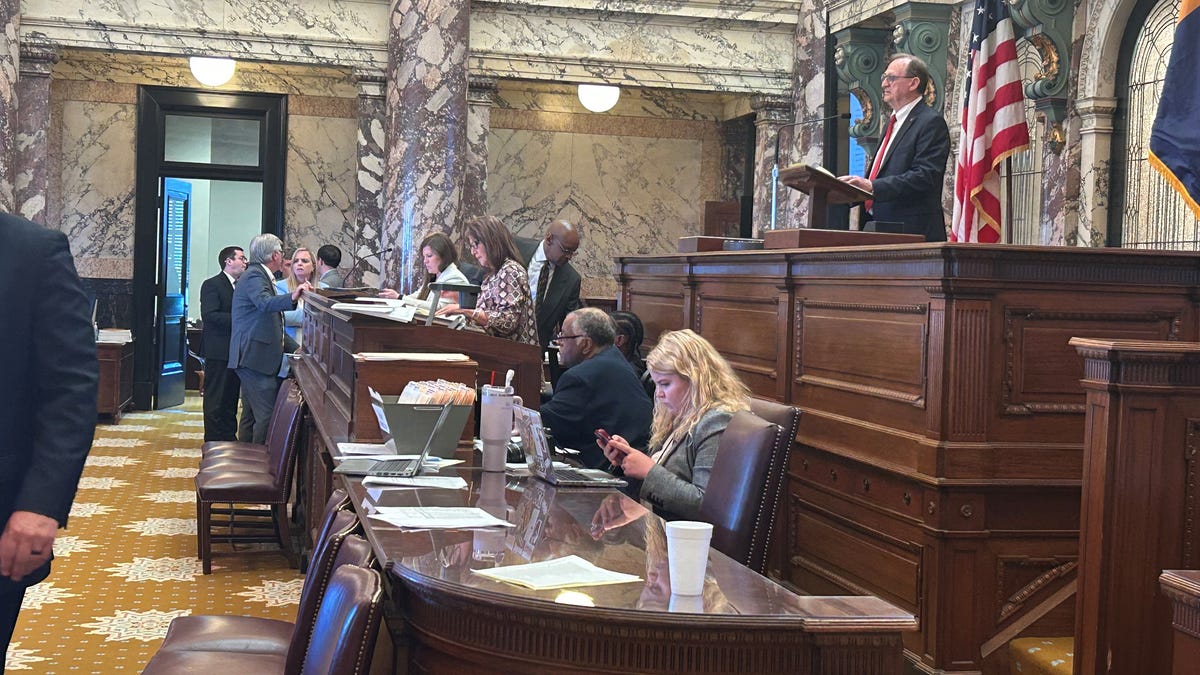Finance
Citigroup says some predecessor companies likely saw indirect financial benefits from slavery

Some of the companies that formed what is now Citigroup likely benefitted financially from slavery in the 1800’s, the financial giant acknowledged Thursday, an admission that comes at a time when numerous institutions are re-examining their historic ro…
ByKEN SWEET AP Business Writer
FILE – A Citibank office is seen in New York on Jan. 13, 2021. Some of the companies that formed what is now Citigroup likely benefitted financially from slavery in the 1800s, the financial giant acknowledged Thursday, July 27, 2023, an admission that comes at a time when numerous institutions are re-examining their historic roots and the roles they played in slavery in the U.S. (AP Photo/Mark Lennihan, File)
The Associated Press
NEW YORK — Some of the companies that formed what is now Citigroup likely benefitted financially from slavery in the 1800’s, the financial giant acknowledged Thursday, an admission that comes at a time when numerous institutions are re-examining their historic roots and the roles they played in slavery in the U.S.
In research conducted last year, Citi found that none of its predecessor companies directly purchased, sold, or held slaves. But the research did find that some of predecessor entities “likely indirectly profited from the institution of slavery through financial transactions and relationships with individuals and entities located or operating in the United States before 1866.”
Many of the nation’s biggest banks including Citi are conglomerations of financial institutions that have merged or bought each other over many years. Citi traces its founding back to 1812 when the City Bank of New York was created.
One of Citi’s most prominent presidents in the 19th Century was Moses Taylor, who did business in Cuba that used slave labor to farm sugar.
“Given that a significant portion of Taylor’s businesses was connected to the trade of sugar and its derivatives from Cuban plantations that used slave labor, City Bank of New York likely profited indirectly from enslaved labor in Cuba by engaging in transactions with Taylor and his businesses,” wrote Edward Skyler, Citi’s head of public affairs, in a blog post Thursday.
The bank also had found other directors or founders likely owned slaves through Lehman Brothers, which was founded in Alabama. Citi purchased parts of Lehman in the late 1990s.
Citi is not the first bank to admit it had connections to the institution of slavery.
In 2005, JPMorgan Chase acknowledged that two of its predecessor banks had specific links to the slave trade. In JPMorgan’s case, two banks in Louisiana received thousands of slaves that were used as collateral.
The Charlotte, N.C.-based bank Wachovia, which failed in the 2008 financial crisis and was subsequently bought by Wells Fargo, also admitted in 2005 that it had roots back to slavery. Wachovia found the Bank of Charleston and Georgia Railroad and Banking Company both owned slaves.

Finance
Fed’s preferred inflation gauge shows price increases cooled in April
The latest reading of the Federal Reserve’s preferred inflation gauge showed price increases slowed in April as inflation remained above the Fed’s 2% target. The release comes as investors have been closely watching data releases for signs of how President Trump’s tariff policy is impacting the economy.
The “core” Personal Consumption Expenditures (PCE) index, which strips out food and energy costs and is closely watched by the central bank, rose 2.5% on an annual basis, in line with expectations and lower than the 2.7% seen in March. Core prices rose 0.1% in April from the prior month, in line with expectations and the monthly increase seen in March.
On a yearly basis, PCE increased by 2.1%, below the 2.2% economists had expected.
The release is yet another sign that while economists and consumers alike expect Trump’s tariffs to push prices higher, the inflationary impact from policy largely isn’t showing up in hard economic data. Friday morning’s release reflects the month of April, the first month in which a large portion of Trump’s tariffs were in effect.
It does not include any impacts from the 90-day tariff pause between the US and China.
“The increased tariffs have not yet worked their way into the consumer inflation readings, but we anticipate that the improved inflation trend will reverse in the second half of the year as companies are forced to begin passing along a portion of the increased tariffs in order to protect profit margins,” Nationwide chief economist Kathy Bostjancic wrote in a research note on Friday.
Read more: What Trump’s tariffs mean for the economy and your wallet
On Wednesday, minutes from the Federal Reserve’s May meeting revealed officials are growing increasingly concerned about how Trump’s policies could impact its fight against inflation.
“Almost all participants commented on the risk that inflation could prove to be more persistent than expected,” the minutes read.
Josh Schafer is a reporter for Yahoo Finance. Follow him on X @_joshschafer.
Click here for the latest economic news and indicators to help inform your investing decisions
Read the latest financial and business news from Yahoo Finance
Finance
Macroeconomy, Finance, and Procurement Among China’s Legislative Priorities – The US-China Business Council

Finance
Santacruz Silver Reports Year End 2024 Financial Results

VANCOUVER, BC, May 28, 2025 /CNW/ – Santacruz Silver Mining Ltd. (TSXV: SCZ) (OTCQB: SCZMF) (FSE: 1SZ) (“Santacruz” or the “Company”) reports its financial and operating results for the year ended December 31, 2024 (“FY 2024”). The full version of the audited financial statements for FY 2024 (the “Financial Statements”), which includes a restatement of comparative 2023 consolidated financial statements, and accompanying Management’s Discussion and Analysis (the “MD&A”), can be viewed on the Company’s website at www.santacruzsilver.com or on SEDAR+ at www.sedarplus.ca. All amounts are expressed in U.S. dollars, unless otherwise stated.
FY 2024 Highlights
-
Revenues of $283 million a 13% increase year-over-year.
-
Gross Profit of $57 million, a 1670% increase year-over-year.
-
Net Income of $165 million, a 1594% increase year-over-year.
-
Adjusted EBITDA of $53 million, a 200% increase year-over-year.
-
Cash and cash equivalents of $36 million, a 622% increase year-over-year.
-
Working Capital was $46 million at the end of FY 2024.
-
Cash cost per silver equivalent ounce sold of $21.90, a 16% increase year-over-year.
-
AISC per silver equivalent ounce sold of $26.01, a 15% increase year-over-year.
-
Silver Equivalent Ounces produced of 18,651,701, a 1% decrease year-over-year.
Arturo Préstamo, Executive Chairman and CEO of Santacruz, commented, “FY 2024 was a transformative year for the Company, driven by our strong financial and operational results. Santacruz achieved a 13% increase in revenue and a 200% rise in adjusted EBITDA, supported by operational improvements and a favorable silver price environment. These achievements strengthened the Company’s balance sheet which allowed us to end the year with $36 million in cash, a 622% increase. In addition, we significantly worked on enhancing shareholder value while maintaining a disciplined operational focus and laying the groundwork for long-term growth.”
Mr. Préstamo continued, ” In preparation for the audit, the accounting team identified a series of non-cash errors booked during the tenure of the former CFO. These non-cash errors caused a significant number of related adjusting entries in the current and prior years creating additional audit work and therefore the subsequent delay in filing the financial statements. Santacruz’s competitive edge lies in the quality and efficiency of our core Bolivian and Mexican mining assets and the flexibility of our San Lucas ore sourcing model, which enables swift adaptation to market conditions and maximizes the benefits of our leverage to rising metal prices. With this solid foundation and an experienced management team, we are well-positioned to enter a new phase of sustainable growth while continuing to deliver value to our shareholders.”
-

 Education1 week ago
Education1 week agoVideo: Columbia University President Is Booed at Commencement Ceremony
-

 Technology1 week ago
Technology1 week agoAMD’s new RX 9060 XT looks set to challenge Nvidia’s RTX 5060
-

 Technology1 week ago
Technology1 week agoAre Character AI’s chatbots protected speech? One court isn’t sure
-

 News1 week ago
News1 week agoRead the Full ‘Make America Healthy Again’ Report
-

 Culture1 week ago
Culture1 week agoHow Manga Megastar Junji Ito Makes Terrifying Series Like ‘Uzumaki’
-

 News1 week ago
News1 week ago'Golden Dome' Missile Shield To Be 1st US Weapon In Space. All About It
-

 News1 week ago
News1 week agoVideo: Trump Repeats False Claims to South African President
-

 World1 week ago
World1 week agoBelgium requests lifting of MEP immunity to investigate Huawei scandal



















